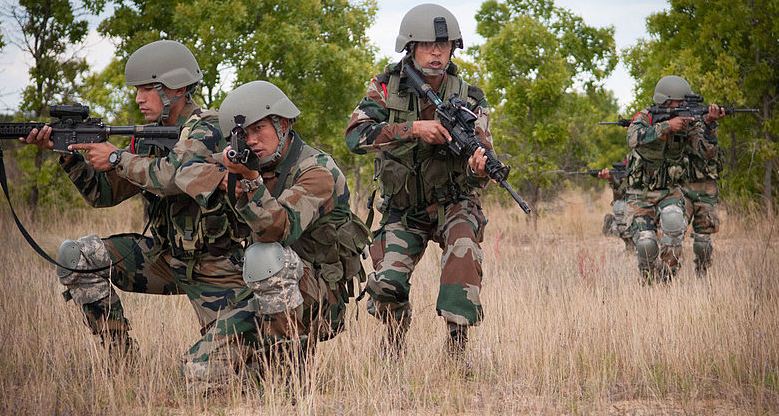Ever since the turn of the century, it has been clear that fighting wars on the battlefield is now a thing of the past and countries must prepare for a hybrid war in order to safeguard their sovereignty. The situation has been further exacerbated by China, the modern-day version of East India Company and India needs to be prepared for any Chinese threat which necessarily might not take place at the border. In an encouraging development, the Indian Army, Navy and the IAF will now jointly train for nuclear-biological-chemical warfare and intelligence.
ThePrint reports that the Integrated Defence Staff headquarters has planned Joint Services Training Institutes (JSTI) for training in select subjects at existing institutes. Intelligence, military law, nuclear biological chemical warfare are some of the subjects where the officers will be trained jointly.
ThePrint quoted an anonymous official as saying, “Additionally, the School of Foreign Languages will also function as a JSTI. The institute, which sees officers of the armed forces from other countries, plays a key role in defence cooperation that is an important facet of military diplomacy where expertise in foreign languages such as Mandarin or Russian is critical.”
The idea of Joint Services Training Institutes was born in 2016 when the Modi government had constituted the Shekatkar committee of experts to “recommend measures to enhance combat capability and rebalance defence expenditure of the armed forces”.
The panel in its report had requested for at least 10 subjects — CBRN, military law, music, catering, intelligence and information warfare, along with UAVs, common air defence weapon systems, helicopters, physical training (PT) and provost — to be offered for joint training at the planned Joint Services Training Institutes for the Indian Army, Navy and the IAF.
Lt Gen. D.B. Shekatkar said, “For instance, intelligence gathering is not confined to only one service. The threats emerging from Pakistan and China are the same for all services. Certain aspects of intelligence must be taught to all services. So, instead of three places, we felt there should be one institute for the purpose.”
He added, “Sharing of experience and vision is critical in the military. Training together will also result in saving of funds, manpower and infrastructure thus aiding the rebalancing of defence budget.”
Recently, according to a study by Recorded Future, a US-based company, Chinese state-backed hackers have targeted Indian organisations in a desperate bid to steal critical information. After India resoundingly defeated China in its own game when it came to vaccine diplomacy or the confrontation at the Eastern LAC, it has now come to light that Chinese state-sponsored groups intruded into the computer networks of at least a dozen Indian state-run organisations to cause major disruptions in the country.
The campaign to intrude into the Indian government-run organisations and install malware began in mid-2020 with a special focus on power utilities and load despatch centres. The country’s largest power conglomerate, NTPC Limited was among the organisations which were targeted by the Chinese hackers, who also targeted five key regional load despatch centres that help in the management of the national power grid by balancing electricity supply and demand and two ports, according to the report.
The Indian Army, Navy and the IAF jointly training for nuclear-biological-chemical warfare and intelligence will thus help India get an upper hand in countering any Chinese threat which necessarily might not take place at the border.
